Karnataka – Congress President Mallikarjun Kharge‘s recent statement regarding Kharge on Karnataka CM change has intensified political discussions across the southern state. Speaking from Bengaluru, Kharge emphasized that the party’s high command holds exclusive authority over leadership decisions, including potential changes to the chief ministerial position in Karnataka.
High Command Authority on Leadership Changes
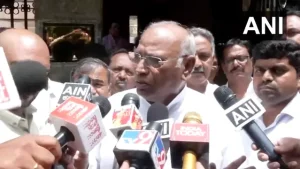
The significance of Kharge on Karnataka CM change statement cannot be understated as it comes amid growing speculation about potential leadership transitions in Karnataka. When questioned by reporters about Congress leaders openly discussing a possible chief ministerial change in October, Kharge maintained that such decisions rest solely with the party’s high command.
“See, that is in the hands of the high command. Nobody can say here what is going on in the high command. This is left to the high command, and the high command has got power to take further action. But unnecessarily, one should not create a problem,” Kharge stated, reinforcing the centralized decision-making structure within the Congress party.
The Kharge on Karnataka CM change remarks reflect the party’s attempt to maintain discipline and prevent unauthorized speculation about leadership transitions that could potentially destabilize the state government.
Surjewala’s Assessment Mission
Central to the Kharge on Karnataka CM change discussion is the role of Congress general secretary Randeep Singh Surjewala, who has been tasked with assessing the ground situation in Karnataka. Kharge specifically mentioned Surjewala’s ongoing mission, stating that decisions would be based on his comprehensive report and feedback gathering exercise.
“Surjewala has come. Based on his report and the feedback he gathers we will decide what steps to take,” Kharge explained, indicating that the Kharge on Karnataka CM change decision-making process involves thorough evaluation of party dynamics and stakeholder opinions.
Surjewala’s mission includes separate meetings with all party legislators, Members of Parliament, ministers, district leaders, and senior party functionaries. This comprehensive consultation process suggests that any decision regarding Kharge on Karnataka CM change will be based on extensive internal feedback rather than external speculation.
Internal Party Dynamics and Speculation
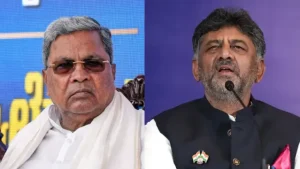

The context surrounding Kharge on Karnataka CM change statements stems from recent comments by Congress legislators that have fueled speculation about potential leadership transitions. Congress legislator HA Iqbal Hussain’s claim that Deputy CM DK Shivakumar might get an opportunity to become chief minister within two to three months has added momentum to these discussions.
Also Read: Maharashtra Cancels 3 Language Policy Resolution Amid Hindi Imposition Charges
Similarly, cooperation minister KN Rajanna’s hints about “revolutionary” political developments in the state after September have contributed to the atmosphere of speculation that prompted the Kharge on Karnataka CM change clarifications. These unauthorized statements have created uncertainty that the party leadership is now attempting to address through official channels.
The Kharge on Karnataka CM change response indicates the party’s concern about uncontrolled speculation that could impact government stability and party unity in the crucial southern state.
Siddaramaiah’s Position and Unity Display
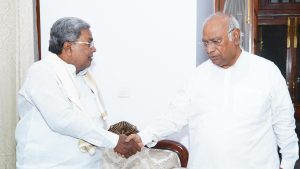

In response to growing speculation surrounding Kharge on Karnataka CM change discussions, Chief Minister Siddaramaiah has maintained a defiant stance, dismissing reports of internal conflicts within the Congress government. Speaking from Mysuru alongside Deputy CM Shivakumar, Siddaramaiah asserted his government’s stability and longevity.
“This government will be as solid as a ‘bande’ (rock) for five years,” Siddaramaiah declared, directly addressing concerns raised by Kharge on Karnataka CM change speculation. The chief minister’s confidence reflects his belief in maintaining the current leadership structure despite ongoing discussions.
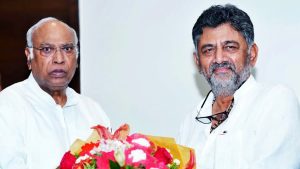

The unity display between Siddaramaiah and Shivakumar, where they held hands as a sign of solidarity, was clearly aimed at countering narratives emerging from Kharge on Karnataka CM change discussions. “We are on good terms,” Siddaramaiah emphasized, with Shivakumar nodding in agreement.
Party Leadership Concerns
Senior Congress leaders have expressed concerns about the potential implications of Kharge on Karnataka CM change discussions, particularly regarding the stability of the state government. A senior Congress Working Committee member highlighted that Siddaramaiah enjoys substantial support among MLAs, suggesting that any leadership change could have destabilizing effects.
“Siddaramaiah enjoys support of a large number of MLAs. His removal will destabilise the government,” the CWC member stated, providing context to the Kharge on Karnataka CM change debate within party circles.
These concerns reflect the delicate balance the party must maintain between addressing internal dynamics and ensuring governmental stability in a strategically important state like Karnataka.
Opposition Response and Political Commentary
The Kharge on Karnataka CM change statements have drawn sharp responses from opposition leaders, particularly from the BJP. Senior BJP leader R Ashoka questioned Kharge’s authority within the Congress party structure, wondering about the actual decision-making hierarchy.


“Dear Kharge Ji, if you are not the high command, then who is? Rahul Gandhi? Sonia Gandhi? Priyanka Gandhi or is it an invisible committee of one surname?” Ashoka questioned, using Kharge on Karnataka CM change comments to highlight what he perceives as leadership confusion within the Congress party.
The BJP leader’s criticism suggests that Kharge on Karnataka CM change statements may have inadvertently raised questions about power structures within the Congress organization, providing ammunition for political opponents.
Strategic Implications for Congress
The Kharge on Karnataka CM change discussion reflects broader strategic considerations for the Congress party in Karnataka. As one of the few states where Congress holds power, maintaining stability while managing internal dynamics becomes crucial for the party’s national political prospects.
The Kharge on Karnataka CM change approach of centralizing decision-making authority aims to prevent unauthorized speculation while ensuring that any leadership transitions, if necessary, occur through proper organizational channels rather than public pressure or media speculation.
Future Course of Action
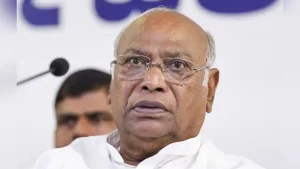

The resolution of Kharge on Karnataka CM change discussions will likely depend on Surjewala’s comprehensive assessment and the subsequent high command deliberations. The party’s emphasis on systematic evaluation suggests that any decisions will be based on organizational interests rather than individual ambitions or external pressures.
As Kharge on Karnataka CM change discussions continue to evolve, the Congress party faces the challenge of balancing leadership aspirations with governmental stability, ensuring that Karnataka remains a stronghold for the party while addressing legitimate concerns about leadership effectiveness and party unity in this crucial southern state.

